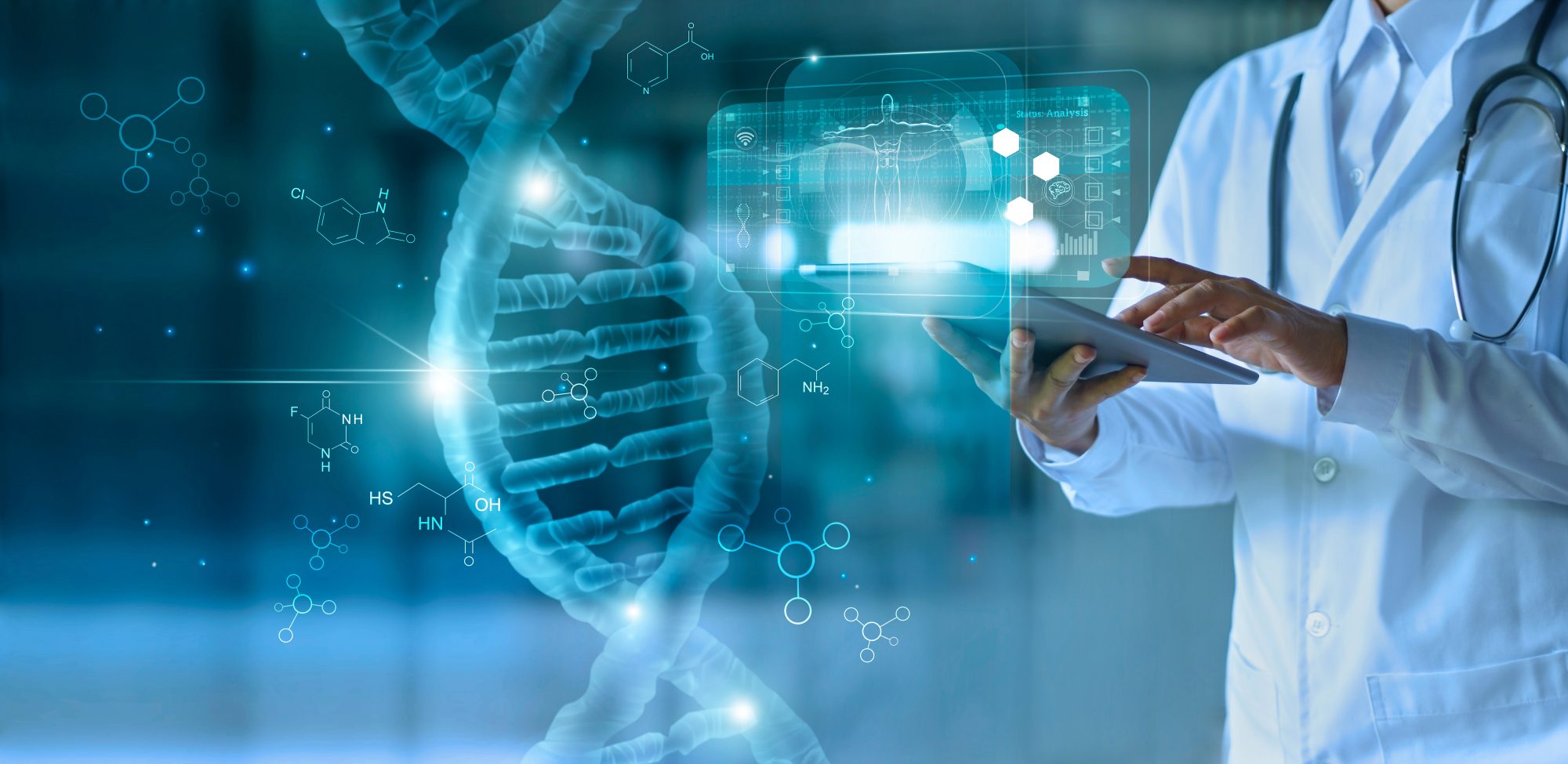The integration of Artificial Intelligence (AI) into healthcare has revolutionised the industry, improving patient care, diagnosis, and treatment, as well as streamlining administrative processes. In this blog, we’ll explore 10 transformative applications and innovations of AI in healthcare. AI has allowed for significant advancements in the healthcare app development sector, and we are one of the notable companies leading in this domain, specialising in custom healthcare app development and medical app development.
- Medical Imaging
AI has brought remarkable improvements to medical imaging, a cornerstone of healthcare diagnostics. Traditional diagnostic imaging techniques such as X-rays, MRIs, and CT scans generate vast amounts of data, which can be overwhelming for human radiologists. AI algorithms can process these images rapidly and with remarkable accuracy, aiding in the detection of subtle abnormalities that might be missed by the human eye. AI can assist in image reconstruction and enhancement, making it possible to reduce radiation exposure in the case of X-rays. This not only enhances diagnostic capabilities but also reduces the potential risks associated with certain medical procedures.
Our healthcare app development company plays a crucial role in incorporating AI into medical imaging apps. These applications facilitate healthcare professionals’ access to images and provide advanced tools for image analysis, leading to more efficient and precise patient care.
- Predictive Analytics
Predictive analytics in healthcare is a game-changer. AI algorithms, powered by machine learning, can analyse patient data to predict various aspects of healthcare, including disease outbreaks, patient readmissions, and individual patient health trends. For example, these algorithms can identify patterns in patient data that may indicate the early stages of a disease, allowing for timely intervention.
In the realm of healthcare app development, we specialise in creating custom predictive analytics tools. These tools empower healthcare providers with the insights needed to make informed decisions, optimise resource allocation, and ultimately improve patient outcomes, all while reducing costs.
- Drug Discovery
Drug discovery has long been a laborious and costly process, but AI is reshaping this landscape. By analyzing vast datasets of chemical compounds and biological information, AI algorithms can identify potential drug candidates, assess their effectiveness, and even suggest novel combinations of existing drugs for new therapeutic applications.
Through AI-driven simulations, pharmaceutical researchers can accelerate the drug discovery process, which traditionally takes years, to a matter of months. This not only reduces costs but also opens doors to innovative treatments and therapies for various diseases.
AI in healthcare app development can create specialised applications for pharmaceutical companies, streamlining the drug discovery process and expediting the delivery of life-saving medications to patients.
- Personalised Treatment Plans
Every patient is unique, and AI-driven healthcare apps acknowledge this by providing personalised treatment plans. These applications analyse an individual’s health records, taking into account their medical history, genetic information, and lifestyle factors. Based on this comprehensive analysis, AI can recommend specific medications, therapies, and lifestyle changes tailored to the individual.
The key advantage of personalised treatment plans is improved patient adherence. Patients are more likely to follow treatment regimens when they believe their care is personalised to their specific needs and circumstances. This results in better patient outcomes and enhanced quality of life.
Medical app development can create user-friendly, AI-powered apps that assist healthcare providers in offering personalised treatment plans, enhancing patient engagement and adherence to care plans.
- Telemedicine and Remote Monitoring
The COVID-19 pandemic accelerated the adoption of telemedicine, a field where AI plays a vital role. AI-powered chatbots can conduct initial patient assessments, collect medical histories, and guide patients through various health concerns. These virtual assistants provide a bridge between patients and healthcare providers, making healthcare more accessible and convenient.
Furthermore, remote monitoring devices, coupled with AI, allow healthcare professionals to track patient vital signs and health data in real time. If any anomalies or concerning trends are detected, the system can automatically alert healthcare providers, enabling timely intervention.
Custom healthcare app development by 5StarDesigners can create telemedicine apps and remote monitoring solutions, offering a seamless and secure way for patients to access healthcare services from the comfort of their homes.
- Natural Language Processing (NLP)
Natural Language Processing (NLP) is a subset of AI that focuses on the interaction between computers and human language. In healthcare, NLP is a valuable tool for extracting meaningful information from the vast amount of unstructured data found in medical records, clinical notes, and research papers.
NLP algorithms can identify relevant clinical information, such as patient demographics, symptoms, diagnoses, and treatments, in electronic health records (EHRs). This allows healthcare providers to access and utilise this valuable data for clinical decision-making, research, and public health surveillance.
AI in Healthcare App Development leverages NLP to create applications that assist healthcare professionals in managing and analysing medical documentation more efficiently, reducing the time and effort required for these tasks.
- Virtual Health Assistants
Virtual health assistants are AI-powered applications that engage with patients, providing information on medications, treatment plans, post-operative care, and more. These assistants not only offer support to patients but also relieve the administrative burden on healthcare professionals, enabling them to focus on complex clinical tasks.
Virtual health assistants can be integrated into healthcare apps, providing patients with real-time information and guidance on managing their health conditions. These applications also facilitate communication between patients and healthcare providers, enhancing patient engagement and satisfaction.
Our expert healthcare app development company can develop user-friendly virtual health assistant apps tailored to meet the specific needs of healthcare providers and patients.
- Robotics in Surgery
AI-driven robotics have revolutionised the field of surgery. These robotic systems, often controlled by skilled surgeons, enhance precision, dexterity, and visualisation during surgical procedures. Robotics in surgery enables minimally invasive techniques, resulting in smaller incisions, less pain, and quicker patient recovery.
Robotic systems equipped with AI can offer real-time feedback and even predictive analysis to assist surgeons in complex procedures, making surgery safer and more efficient. These systems are particularly beneficial in fields like orthopaedics, urology, and neurosurgery, where precision is paramount.
Custom healthcare app development can integrate AI-driven robotics into surgical procedures, providing healthcare professionals with cutting-edge tools to perform procedures with unprecedented precision.
- Early Disease Detection
The early detection of diseases is a cornerstone of effective healthcare. AI can analyse patient data, including medical histories, lab results, and lifestyle factors, to detect the early signs of diseases such as diabetes, cardiovascular conditions, and cancer. This proactive approach allows healthcare providers to implement timely interventions and improve patient outcomes.
Medical app development in collaboration with AI can offer healthcare providers dedicated tools for early disease detection, making use of predictive models and machine learning algorithms. By identifying risk factors and early symptoms, these applications can significantly contribute to saving lives and reducing healthcare costs in the long run.
- Administrative Efficiency
AI is not limited to clinical applications; it also improves administrative aspects of healthcare. Administrative tasks in healthcare, such as scheduling appointments, processing billing, and managing patient records, can be resource-intensive and prone to errors. AI-driven chatbots and automation systems can handle routine administrative tasks efficiently.
For example, chatbots can assist patients in scheduling appointments, answering frequently asked questions, and providing reminders for medication or upcoming appointments. This enhances the patient experience, reduces wait times, and ensures better patient engagement.
AI in healthcare app development can create applications that streamline healthcare operations and improve administrative efficiency. These applications can be customised to meet the unique needs of healthcare providers, ultimately reducing administrative costs and improving overall patient satisfaction.
Conclusion
Artificial intelligence has ushered in a new era of innovation and transformation in healthcare, touching virtually every aspect of patient care, diagnosis, treatment, and administrative efficiency. The integration of AI in healthcare apps is a pivotal step towards improved healthcare access and patient outcomes. Companies like 5StarDesigners, a healthcare app development company, are at the forefront of this revolution, offering custom healthcare app development services to meet the growing demand for AI-powered healthcare solutions. As AI continues to advance, we can expect even more remarkable developments that will further improve patient care and the overall healthcare experience, offering a brighter and more promising future for healthcare worldwide.











